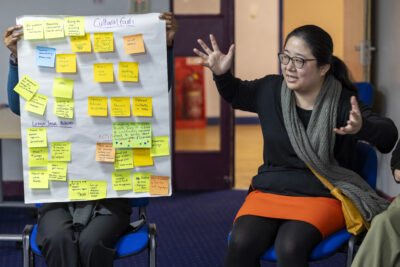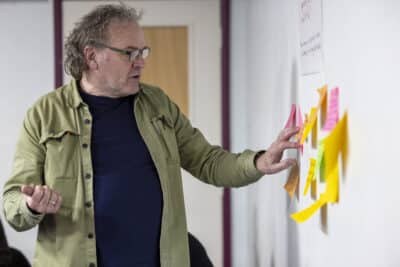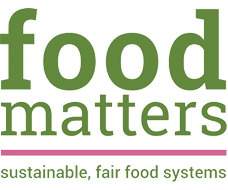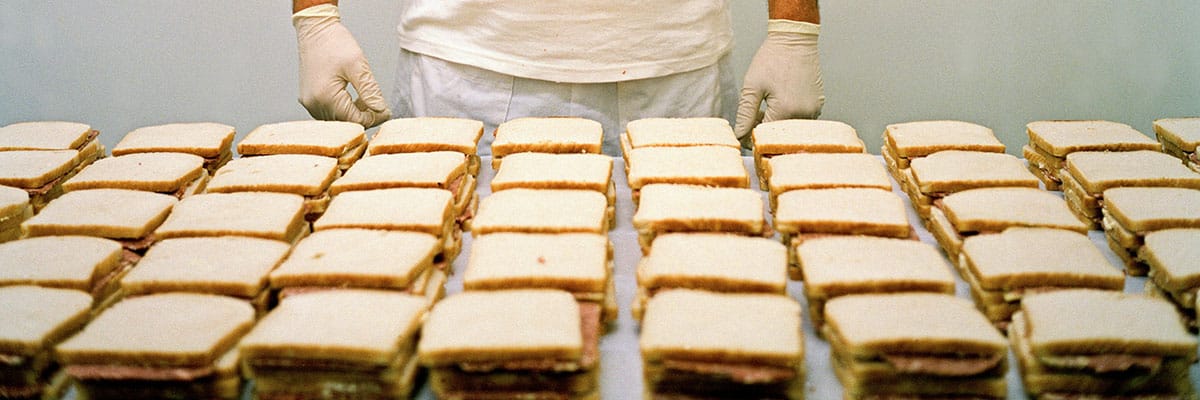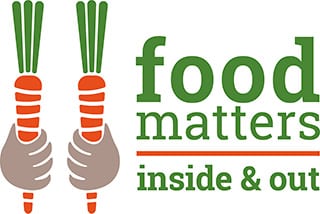We’re celebrating 20 years of Food Matters in 2024 – and a lot has happened in that time!
When we first began, almost no-one knew what a food partnership was, nor were the words food systems or food policies in the mainstream. Now there are over 90 food partnerships nationally; some councils have their own food policy officer; and the pivotal role of food on our climate, health, and societies is more widely recognised.
Whilst we work within food systems, our focus has always been about people. We started as a group of food campaigners who were looking at how we could translate European and national food policy into strategies and actions that were meaningful, relatable, and understandable to people’s local circumstances. We took the approach of actively engaging with people – bringing them into conversation so they felt empowered to understand and influence food policy. This is because we believe that change happens when policy interventions align with people’s ability to make change happen.
So, what have been some of our key achievements over these 20 years? And where would we like to go next?
We started the UK’s first independent food partnership and wrote the UK’s first comprehensive food strategy
This work eventually evolved into our role as one of the founding partners of the Sustainable Food Places programme. Recently, we developed an evaluation hub for the Sustainable Food Places programme, which brings together hundreds of examples of impact from the 90+ Food Partnerships across the UK.
We wrote the UK’s first food strategy back in 2003 in Brighton & Hove, with a vision of bringing together coordinated action on food in the city. We wanted to bring together actions on cooking, growing, education, waste, health interventions, procurement, and retail – which was unchartered territory at this time, with action on food generally sitting within council departments such as health. To write this food strategy, we brought together hundreds of stakeholders across the city, inspiring wide public engagement on the topic of food. Along side this process, the Brighton & Hove Food Partnership [BHFP] was born, as the organisation to co-ordindate the action plans from the food strategy.
This was one of our first major pieces of public participation and engagement. Building upon these processes, we designed and co-developed the Sustainable Food Places programme, providing training, a toolkit and process map for those wanting to set up their own local food partnerships. This programme started out with 6 pioneering partnerships and has blossomed to over 90 members across the UK. Read our Building Local Food systems handbook here, or check out the SFP toolkit here to learn more about the participatory processes we have developed and facilitated.
This work continues to evolve – we brought were involved in the good food governance expertise to the European Foodshift 2023 Horizon programme – and continue to provide bespoke facilitation and consultation to aspiring food partnerships. If you want to work with us to set up or revitalise a food partnership in your area, get in contact here.
A national evaluation of the Healthy Start and School Food Matters scheme and consultation on the Rose Voucher Scheme
We collaborated with York University to ensure the voices of the lived- experienced were heard in a national evaluation of the Healthy Start scheme, which (alongside other campaigns) has led to improvements such as an increase to the amount of money recipients received in 2020, and in 2022 a transition to pre-paid card digital system. This evaluation fed into the subsequent creation of the Rose Vouchers for fruit and veg scheme, which continues to grow today, enabling eligible families to purchase fruit and veg at their local markets.
We know that for action on food to be really meaningful, it needs to involve the voices of communities – which is the mindset we bring to our consultation and evaluation work, where we involve those who will be impacted by projects in the whole process. Read more about the participatory processes we used when evaluating the Healthy Start, Rose Voucher, and School Food Matters programmes here.
Food and wellbeing programmes
In 2007 we developed the Eating Better, Thinking Better programme. This developed into our FAB (Food and Wellbeing programme), and now is delivered as a Nourishing Young Minds programme. We believe that people are more likely to adopt positive change if they are involved in deciding what that change should be. That’s why we design our training courses in collaboration with participants, to ensure the content is effective and engaging. We encourage people to identify and share the knowledge they already have in order to encourage peer learning and improve confidence and engagement. Read more about our food and wellbeing programmes here.
Developing food mapping and feasability studies that have been replicated nationally
We’ve played a crucial role in mapping + feasibility studies around Brighton & Hove and beyond that have been taken as national models. This includes creating the CPRE Local Food Web Mapping Toolkit, undertaking a CSA feasibility study of Brighton & Hove in 2011 which resulted in the successful Brighton & Hove Sheepshare, a food growing land mapping database, and co-developing the groundbreaking 2011 Planning Advisory Note 06 (PAN06) that encourages developers to include space for food growing in new developments. We know that when people understand their local food web, they can help to strengthen it and establish new links between different components of the web. Local, place-based knowledge is at the heart of all our feasibility and mapping tools.
Nutritional workshops within prisons, and advocacy and campaigning outside of prisons to create better food systems within the criminal justice system
We aim to transform prison food systems through our advocacy work, such as our pivotal 2024 ‘Food Matters in Prisons’ report, and our work within prisons holding nutritional workshops and producing a monthly newsletter. We focus on the positive role food can play in normalising life in prisons and supporting a rehabilitative culture inside and out. Since starting to work in prisons 12 years ago, we have become recognised names at the forefront of campaigns to improve prison food systems, with a focal priority being to raise attention and start conversations around the topic of food in prisons. Check out our webinar and blog series to learn more.
Developing resources food organisations nationally to become more actively anti-racist and inclusive
We developed the ‘REDI for Change’ toolkit as part of Sustainable Food Places, a tool for food partnerships to review their culture, practices, and people in relation to race, equity, inclusion, and diversion. This piece of of work acknowledges the ways in which racism specifically is built into our food system, and looks at the role food partnerships and organisations can play in tackling this by taking measures to become actively anti- racist and more inclusive. We published the Sankofa report, written by Jada Phillips who was an intern with us in 2022. This report explores the food system through a food justice angle, highlighting the history and role of British colonialism within our food system.
What about the next 20 years?
Well – we hope that we are no longer needed, so we can pack up and head to the beach and go swimming…failing that however, we do want to see:
– A food partnership in every town, city, and district in the UK.
– Recognition for the importance of food within prisons. We want to see funding for prison food programmes, and a culture that embeds food into recovery and wellbeing programmes, with food playing a central role in recovery and rehabilitation in prison policies and strategies.
– Public procurement that values and funds healthy, sustainable, and local food. We want this to be a foundation that sustains public health, local economies, and the environment.
– Everyone having equal opportunity to access good food that nourishes them and that doesn’t cost the planet.
